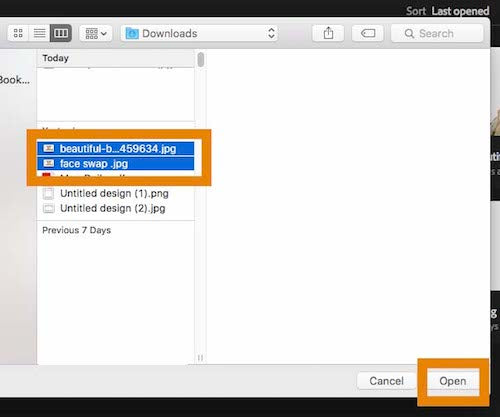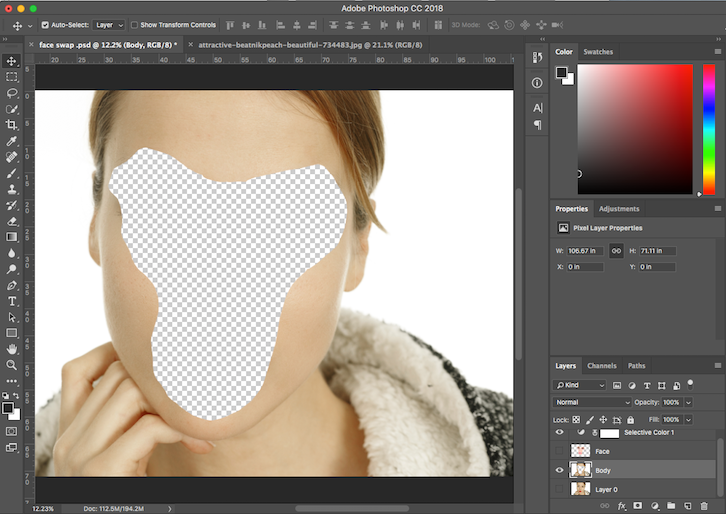The Photoshop face swap technique allows you to completely alter a model’s face. This is helpful in humanizing your product photos and making the most of your investment.
How to Swap Faces in Photoshop
- Open your image files in Photoshop
- Select the face you want in your final photo
- Copy the image
- Paste the image
- Resize the image
- Copy your background layer
- Create a clipping mask
- Create a slight overlap of the face with the body
- Delete the face from the body layer
- Select the body and face layers
The Photoshop face swap is an image-editing technique that allows you to essentially swap faces of different people using Photoshop. The Photoshop face swap technique is especially useful for ecommerce brands who want to make the most of their product photography investments.
There are many reasons you’d want to do a Photoshop face swap, including:
- Adding variety to the models featured in your product photos (remember, consumers like to see people who look like them)
- Using a shot where everything but the model’s face was in the right position
- Making an unhappy or angry child happy again
In this article, we’ll learn the Photoshop face swap and blend technique in just 10 easy steps.
Step 1: Open your image files in Photoshop
Open the two headshots in Photoshop by clicking File and selecting Open from the dropdown menu. It’ll open a new window where you can select the photos.

You can select both by holding the CTRL key (COMMAND on a Mac) while you click the second file.

Step 2: Select the face you want in your final photo
Click on the file tab that corresponds to the face that you want in the final photo. Select the Lasso Tool by pressing L on the keyboard or selecting it from the tool menu. Carefully trace around the eyebrows, nose and lips.

It’s best to select only the most highlighted portions of the face so that you can swap faces with a more realistic outcome. It’ll have a flashing dotted line around it when you’re finished.

Step 3: Copy the image
Click CTRL+C (or COMMAND+C for Mac users) to copy the selection. Make sure the dotted line is still flashing.
Step 4: Paste the image
From the tabbed workspaces, select your workspace that contains the face from your original shot that you want to replace. This will be your “body” layer. Press CTRL+V (COMMAND+V on Mac) to paste the copied face to the photo. Then press CTRL+D (COMMAND+D for Mac users) to deselect the face and remove the flashing line.

Step 5: Resize the image
Adjust the layer to 30% opacity so that you can see beneath the layer. Using CTRL+T (COMMAND+T for Mac), position the face by lining up the eyes and mouth, stretching as needed to get them to line up as closely as you can.

To adjust the face proportionately hold the Shift key and click the box and drag. If you hover near the corner, it will give you rotation toggles that allow you to turn the image.

Getting the faces to line up well will require some patience, and a little trial and error using your eye to find the position that looks most natural.
Once you’re happy with the placement, press Enter to finalize your placement. This is really important. If you forget to press Enter when you finish, all of your hard work will be lost.
Then adjust the layer opacity back to 100%.
Step 6: Copy your background layer
Next, you’ll need to duplicate your background layer. From the layer menu select your background layer. You can right click and select Duplicate Layer or use the keyboard shortcut by pressing CTRL+J (COMMAND+J on Mac).
Rename the copy layer “body” as it will make up the majority of your final photo. Go ahead and click on the Visibility Eye to hide the background layer.

Step 7: Create a clipping mask
Press CTRL (COMMAND on Mac) while clicking the thumbnail of the face layer. This will select the shape of the face on all layers.

Select the body layer and click on the Visibility Eye of the face layer to hide it. After the background and face layer are hidden you will only see the layer you have selected.
Step 8: Create a slight overlap of the face with the body
Go to the Photoshop menu in the header and click Select. Then choose Modify and select Contract.

In the dialogue box, type 10 pixels. This will shrink the clipping mask by 10 pixels which will allow the face to overlap the body by a few pixels.

Step 9: Delete the face from the body layer
While the body layer is still selected, press Delete or Backspace to remove the area beneath the face. Press CTRL+D (COMMAND+D on Mac) to deselect.

Step 10: Select the body and face layers
Go to Edit in the Photoshop menu. Select Auto-Blend Layers from the dropdown menu.

A box will pop up (see screenshot below). Select Panorama and check the box for Seamless Tones and Colors and Content Aware Fill Transparent Areas before clicking OK.

Here’s what you’ll be looking at:

And your final image should like this:

How Do You Change Skin Color in Photoshop?
There are several techniques you can use to change skin color in Photoshop. We recommend first using the auto-blend function and selecting the naturally highlighted areas of the face. This makes the blending look more natural even in cases where the tones may not match perfectly.
If you need to change the skin color for your Photoshop face swap, instead of following Step 10 in the tutorial, you could also try one of the following:
- Assess the difference in brightness and color of the two images. Then using Hue, Saturation, Brightness and a Layer Mask you can adjust each one independently until you achieve the desired tone.
- Another option is to use the Selective Color Mask. This technique uses a layer mask to protect the areas that do not need color adjustment. It alters the CMYK and RGB colors of the layers until they match.
- A third method is to use the Curves function with a Layer Mask to protect areas that do not need color adjustment.
What Is the Layer Mask in Photoshop?
You use a Layer Mask in Photoshop to select only parts of an image. The Layer Mask hides portions of your photo from being seen. That’s why it’s helpful in the Photoshop face swap: It preserves parts of the original face while replacing other parts of the face with a different one.
Photoshop automatically creates the Layer Mask as a function of the Auto-Blend feature.
The Layer Mask uses black and white to denote areas of exposure. The white areas are exposed and the black areas are not. Additionally, you can use the Paintbrush tool to apply white or black to the image for better precision.
There are other uses for the Layer Mask, such as removing an element or object from an image or superimposing multiple images together.
Using the Photoshop Face Swap Technique in Product Photos
The Photoshop face swap technique can be applied to other scenarios, more than just switching faces. For ecommerce product photography in particular, the Photoshop face swap has a few potential uses. This means you can more easily get varied product photos for a smaller investment.
For example:
- For jewelry product photography, you can swap out stones, pendants or gems
- In apparel, you can switch the designs on a t-shirt

- When you have lifestyle photos with models, you can use the Photoshop face swap to change their hairstyles
- You can change the graphic on a mug or pint glass
- Change the labels on drink bottles, cardboard boxes of food, and other food-related items

Nearly every graphic designer has used Photoshop tutorials to bolster their design skills; in fact, there perhaps no better way to become a better graphic designer than to follow Photoshop tutorials. This is an extremely awesome tutorial.Color correction tutorial
ReplyDeleteGreat and awesome sharing of your. Thanks a lot for sharing. Like and love this kind of sharing.
ReplyDeleteExcellent and great post about the photoshop. thanks for sharing with us.
ReplyDeleteBest Regards,
photoshop image masking